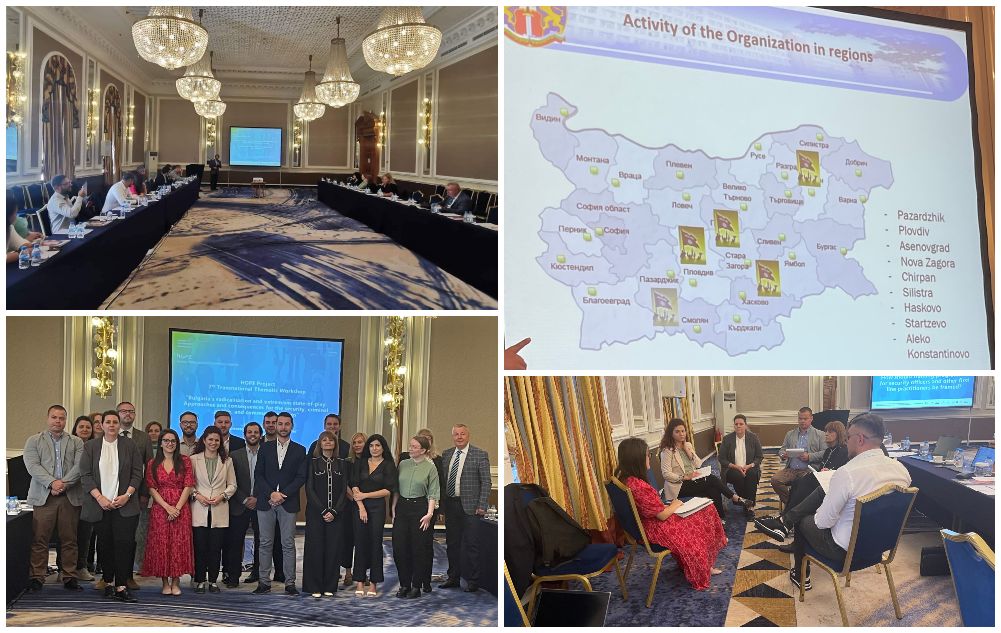A transnational event brought together P/CVE experts and practitioners from nine countries to share insights on the Bulgarian radicalisation challenges and solutions.
The workshop in Sofia, Bulgaria, sought to address the country’s particular regional developments, trends, and threats. These topics include how the country has been tackling the transit of Foreign Terrorist Fighters (FTFs) due to its strategic location, migration waves, and the local threat of far-right extremism.
The extremist trends and the pivotal role of multi-agency cooperation in the Bulgarian landscape were on the table. The discussion encompassed the role of non-governmental organisations and law enforcement agencies in preventing radicalisation and dealing with Violent Extremist Offenders (VEOs).
This was the 7th Transnational Thematic Workshop organised by the HOPE – Holistic Radicalisation Prevention Initiative consortium.
About 25 participants from 9 countries attended, including representatives from the Bulgarian National Security Agency, Ministry of Interior, prison and probation services, law enforcement agencies, police academy, NGOs/CSOs, training institutions, and research think-tanks.

Violent extremism is far from a new trend in the Bulgarian reality. This was one of the points demonstrated by Andrey Momchilov from the IGA-Crime Prevention Fund, who shared examples of violent ideological attacks in the country and other Balkan nations going as far as the early 1900s.
As a representative of the civil society efforts, Mr Momchilov shared how the effectiveness of CSOs in P/CVE is also dependent on the work carried out by governmental bodies, advocating the need to work in a preventive, supportive way based on multi-agency cooperation.
Mr. Stefan Ralchev, from the Center for the Study of Democracy, highlighted how the current regional problems, mostly regarding FTFs, triggered Western Balkans countries to work towards cohesive P/CVE plans. Moreover, as Mr Ralchev concluded, and all participants agreed, despite the common regional trends, each country faces its own challenges regarding radicalisation and how to tackle it.
Simo Mihov, Deputy Director of the National Police Academy, and Ivelina Dundakova, a RAN expert dedicated to Police and Law Enforcement issues, approached the role of police officers in radicalisation prevention.
Mr Mihov explained the workings of Bulgarian law enforcement agents’ training, highlighting that although counter-terrorism topics are part of the officers’ training, radicalisation prevention is not in the curriculum.
However, police officers have a crucial role in radicalisation prevention, as is reiterated by Ms. Ivelina Dundakova, Head of the Bulgarian Unit for International Cooperation of the Ministry of Interior. The expert presented an overview of the challenges of Bulgarian law enforcement in the P/CVE field. She argues for a community-inspired framework to increase the efficiency of interventions. She highlighted the role of community policing and the need to follow a holistic model to include law enforcement agencies in primary, secondary, and tertiary levels of prevention. Cooperation and trust were pinpointed as the key areas to invest in.
Shifting the focus to the prison system, Gerogi Mitev, inspector from the Bulgarian General Directorate for the Execution of Sentences, shared important insight from the well-known case of Ahmed Mussa, a radicalised Bulgarian citizen currently imprisoned.
Mr Mitev detailed practical challenges and lessons from how the Bulgarian prison system handled the imprisonment of Mr Mussa and his group. He highlighted the cultural adjustments and compromises that needed to be made to respect their individual beliefs, despite the fact that they have been placed in isolation.
A practical explanation of the current radicalisation trends was provided by Ms Miglena Bogdanova, who, as a representative from the Bulgarian Agency for National Security, shared how the migration flows have been affecting radicalisation and its perception. She argued that law enforcement agencies often lack the adequate skills to respond appropriately to the changing face of radicalisation. The role of civil society in bridging the gaps felt by law enforcement agencies was emphasised by Ms Bogdanova.
Overall, the experts at the event called for national and international measures to address the exposed challenges. P/CVE efforts must follow a holistic approach, involving different agencies at different levels, even those not working in the security field. Therefore, civil society must be included and capacitated since its locally grounded knowledge can bridge some gaps.
Multi-agency cooperation is paramount. It requires a base of trust and understanding of each partner’s role in the P/CVE strategy. Practical and tailored training is essential to equip practitioners with the needed knowledge and tools.
Trust must be built with the communities to achieve a cohesive and cooperative relationship. Both governmental and non-governmental practitioners can work to increase support, avoid stigmatisation and other societal issues.
Two more in-person TTWs are envisioned, aiming to further the reach of the HOPE project and further solidify its network and learning hub on radicalisation. The next Transnational Thematic Workshops will be held in Ljubljana, Slovenia, to explore the country’s historical specificities and the particular challenges of its landscape of violent extremism.
More information on HOPE’s past and future events can be found on the project’s website and network. By joining the network, members can access a centralised resource database and network with more than 60 worldwide P/CVE experts.
Know more about this project

DIGIDEM
Fostering Digital Democracy and Citizenship in Higher Education
HOPE is led by IPS_Innovative Prison Systems (Portugal) in partnership with organisations from several countries, namely the University College of Norwegian Correctional Service (Norway), Agenfor International Foundation (Italy), the Euro-Arab Foundation for Higher Studies (Spain), the Bulgarian Association for Policy Evaluation (Bulgaria), the Bulgarian General Directorate “Execution of Sentences” (Bulgaria), the Bucharest-Jilava Penitentiary (Romania), the Helsinki Committee for Human Rights in Serbia (Serbia) and the Slovenian Probation Administration (Slovenia).
For more information about the HOPE project and the HOPE Radicalisation Prevention Network, go to www.hope-radproject.org
Related projects

CEDAR
Continuing Education Against Radicalisation

COOPERHATE
Delivering a comprehensive approach to preventing, reporting, investigating and prosecuting hate crime and hate speech-related incidents in Portugal

EUTEx
Developing a European framework for disengagement and reintegration of extremist offenders and radicalised individuals in prison

FUTURE-ART
Sentinels of the Future: Together to Eradicate Human Trafficking

IN2PREV
Law enforcement and community cooperation and training approach to prevent radicalisation by ensuring refugees’ successful inclusion

INDEED
Strengthening a comprehensive approach to preventing and counteracting radicalisation based on a universal evidence-based model for evaluation of radicalisation prevention and mitigation

INTEGRA
Integrated Community, Probation and Prison Services Radicalisation Prevention Approach

KOBAN
Identifying future capabilities for Community Policing

MIRAD
Multi-Ideological Radicalisation Assessment towards Disengagement

PARTES
Participatory Approaches to Protecting Places of Worship
Related news

IPS has joined a new partnership focused on enhancing the prevention, reporting, and investigation of hate crimes and hate speech in Portugal
Read More »
IN2PREV Final Conference highlights cross-sector collaboration for refugee inclusion and radicalisation prevention
Read More »
Standing united against hate: A national effort to prevent and tackle hate crime and hate speech in Portugal
Read More »
New IPS-led initiative unites efforts to protect religious communities, schools, and places of worship
Read More »
IPS contributes to shaping EU’s future agenda on radicalisation prevention at Brussels Town Hall meeting
Read More »



